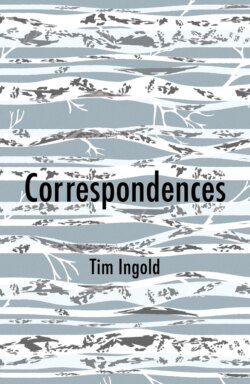Читать книгу Correspondences - Tim Ingold - Страница 6
Invitation Letters from the heart
ОглавлениеIdeas come when you least expect them. If a thought were an expected visitor to your mind, and came knocking by appointment, would it even be an idea at all? For the thought to be an idea it has to disturb, to unsettle, like a gust of wind ruffling through a heap of leaves. You may have been waiting for it, but it still comes as a surprise. Those, however, who aim to get from A to B as quickly as possible have no time to wait. For them, the idea is an unwelcome guest, threatening to throw them off course, if not with losing their way altogether. Yet were it not for ideas, we’d be trapped. The life of the mind would be confined to a shuffle, where nothing really new could ever arise, only rearrangements of an existing pack. These days it has become usual to think of creativity like that: to suppose that there is no new idea that is not a novel permutation or combination of the fragments of old ones. It is as though the mind were a kaleidoscope, equipped with a fixed structure of mirrors and an assortment of beads of different shapes and colours. The mirrors are hardwired cognitive structures, the beads their mental content. Every shake yields a unique pattern, but while we celebrate its novelty, nothing new comes out of it. Each is an end in itself; there is no beginning. Unless … unless we attend to what is usually forgotten, the shake itself. The shake unsettles, there is a momentary loosening, a loss of control. What if the idea were the shake, rather than the pattern that results from it?
‘I’m all shook up,’ sang Elvis Presley; ‘my hands are shaky and my knees are weak.’ Elvis was in love, but I’ve experienced the same nervous agitation when unexpectedly overtaken by an idea. It is as visceral as it is intellectual, if the two can be distinguished at all. The thinker may sometimes seem detached, head in hands, isolated in a bubble, but the lover’s pose is much the same. What the thinker and the lover have in common is that they are uniquely vulnerable. They are in a condition of surrender, whether to the idea or to the beloved. But the condition is far from passive; on the contrary, it is passionate, an affectation of the soul that calls mind and body to contemplation that is furious in its intensity. And it is the fury of thinking, not just in anger but in ecstasy, that I want to celebrate in these pages. It is a fury, in my experience, that can be endured only in relative quietude, when all around is in a moderate state of balance. In the contemporary world, such balance is hard to find, and all the more precious because of it. My fear is that the imbalances of the world – of wealth, climate and education – will render thinking unsustainable, and jeopardize the life of the mind. Indeed we are faced with an epidemic of thoughtlessness, the root causes of which lie in the evacuation from thought of any consideration for its consequences, as if to think were no longer even to care, let alone to love.
It is left for us to decide, warned the philosopher Hannah Arendt, ‘whether we love the world enough to assume responsibility for it’.1 Arendt was writing in the wake of the destruction of the Second World War, but with the world once again on a knife-edge, her words carry equal force today. Only if we fall back in love with the world, she foretold, can there be hope of renewal for generations to come. And to do that, we need to relearn the art of thinking, and of writing, from the heart as much as from the head. In the past, we would think and write like this especially when scribing letters to loved ones, family and friends. As we set pen to paper, our thoughts would fly to the intended recipient, as though we were together with them in conversation. We used to write as we would speak, with feeling and concern, not to publicize a thesis but to carry on a line of thinking that responds, in its moods and motivations, to what we suppose might be going through the mind of the addressee. Working things out as we go along, ideas would appear here with a certain freshness and spontaneity, not yet weighed down by the burdens of subsequent elaboration. But with letter-writing it is not only the words we select that matter; it is also how we write them. Words written by hand, in a cursive script, convey feeling in the very gravity and inflection of the continually looping letter-line. This is more than words can say, yet words are saying it, not by way of the meanings we ascribe to them, but thanks to the expressive power of the line itself. You know me, and how I feel, from the way I write, just as you do from my voice. Everyone’s way is different.
